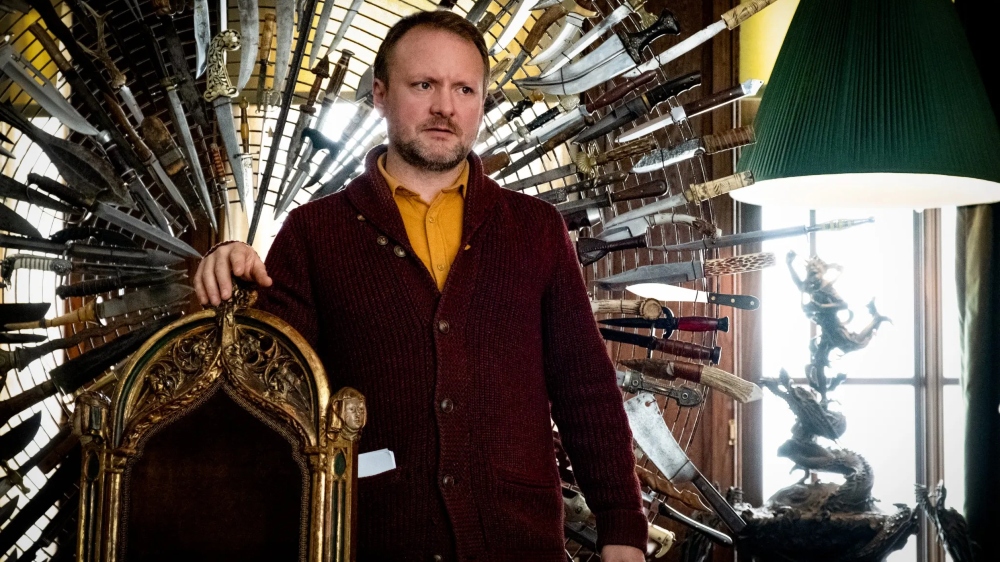If it’s not abundantly clear by now, there is a lot about this business I still don’t understand. Or maybe it’s the vagaries of human behavior and decision-making, I’m not sure. Either way, every time I think I have a handle on things, I get thrown another curveball and am forced to wonder about the world and Hollywood’s place in it.
This week’s mystery involves Netflix and its baffling decision to only allow theaters to show Glass Onion for a single week, despite the enormous success it enjoyed, and the fact that theaters were apparently begging the streamer to extend the run for even a little bit longer. Sadly, Netflix denied that request, and what could have been a boon to the struggling theatrical industry is instead yet another in a long line of frustrations.
Some background: Netflix spent a whole heck of a lot of money convincing Rian Johnson to sign on for multiple Knives Out sequels starring Daniel Craig’s dashing detective Benoit Blanc. The first of those, the aforementioned Glass Onion, hits Netflix two days before Christmas, and is arguably the streamer’s most highly anticipated release this year. In an effort to maximize that anticipation, as well as capitalize on a considerable amount of viewer excitement, Netflix decided to put Glass Onion in theaters for seven days over Thanksgiving, which happens to be one of the biggest movie-going weeks on the calendar.
This move, I understand. By putting the movie in theaters, it adds prestige to both the project and the service, essentially bringing the cache of the big screen to streaming. That part is actually pretty simple, and when I was spending more time in New York City, I would often head to the Paris Theater on West 58th Street and catch one of these Netflix flicks on the big screen.

People definitely showed up for Glass Onion, too. It made about $15 million over the course of the week, which might not seem like much, but when you factor in that it only showed on about 600 screens, for an average of about $25K per screen, that’s pretty, pretty, pretty good. For reference, Knives Out snatched nearly twice as much, $26 million, over its opening weekend three years ago, but it did so on nearly 3,500 screens, or roughly six times Glass Onion‘s number (about $7,500 per screen).
Thus, the pleas from theater owners begging Netflix to extend the film’s theatrical run and help them put butts in seats at the end of yet another tough year in a post-pandemic world. It was a plea that Netflix ignored, if only because it could.
But how much does this help, really? I am on record as stating, here and elsewhere, that I don’t understand the Netflix business model, and this is just the latest example illustrating that. Yes, I understand that Netflix wants to keep its subscribers in its own streaming ecosystem rather than encourage them to visit theaters, but there is so much more money to be made on the big screen, money that Netflix could spend on making its movies better, which would have a trickle-down effect on the streaming side, as people tend to rewatch good movies again and again.
I know that Netflix is introducing a subscription tier that allows for advertising and that co-CEO and Chairman Reed Hastings has admitted that not doing so earlier was a mistake, as it will lead to increased revenue for the streamer and lower subscription rates for cash-strapped viewers who may not mind sitting through a few ads if it lowers their monthly bill. I’m aware of all that.

For these purposes, however, the legitimate question I have to ask is, how many new subscribers do Hastings and Netflix expect to bring in with this new Knives Out movie? Enough to cover its $40 million budget? Because another couple of weeks in theaters almost certainly would have. I know that Netflix seems to have an exceedingly deep well of dough that it likes throwing at creators to fill its service with content, and that well used to be bottomless, with seemingly no end to it. Nine-figure deals for Shonda Rhimes and Ryan Murphy and the Game of Thrones guys? No problem! Huge checks made out to A-list stars such as Dwayne Johnson, Ryan Reynolds, Chris Evans, and Ryan Gosling to buy out their backend on big-budget movies? Sure! Why not? Even as the company was racking up billions of dollars in debt, as long as those subscriber numbers kept rising, everything would take care of itself, right?
Except, that’s not really what happened, because subscription numbers plateaued some time back, the trends haven’t changed all that much, and that great, flowing river of money dried up. Netflix is not in danger of going under any time soon, but its recent move to an ad-based model is not a terribly surprising response to the lingering issue.
Know what would be another good change to Netflix’s overall model? If it put some of its bigger titles in theaters for multiple weeks ahead of any streaming premiere in a serious effort to maximize box office dollars and study what impact a real theatrical run has on a film’s streaming numbers. That would be a pretty good way for Netflix to add to its bottom line. Not all of its movies, of course, but the bigger ones such as The Gray Man or last year’s Red Notice, or, um … Glass Onion?
Last week, Hastings said that the company is “not trying to build a theatrical business,” and that the company is “trying to break through the noise,” but my question is… why? Does Netflix just hate money? They must… otherwise, why would they leave so much of it on the table? The majority of movie fans would likely still watch Glass Onion on the service, and diehard theatergoers such as myself would surely tune in to Netflix for repeat viewings if we enjoyed it enough on the big screen.

To me, it’s the one-week engagements that don’t make any sense. If you’re going to eschew a distribution model, fine, but then, why put movies into theaters at all? Is it to qualify for awards, or perhaps for promotional purposes? Do people really respond to that? Do they see that a movie like Glass Onion is in a theater that may not be anywhere close to them for just a week and say, “Well, I’d better sign up for Netflix to watch that sucker!?” Or does it even register at all? Does the $4 million that Netflix spent on theatrical advertising, combined with the million or so people who saw the film, create spectacular word of mouth? I would argue that people who are already signed up for the service would be pretty primed to see it anyway, and there aren’t a lot of single, standalone films that would entice people to sign up. Franchises, maybe, but single movies? Ehhhh, I don’t think so.
But let’s say that theatrical run does encourage people to sign up for Netflix just to watch Glass Onion. How many millions of people are going to do that, and how many of those will stick around once they’ve watched it? One million signing up for the lower priced service with ads would be (checks notes) $7 million dollars. With people signing up for and dropping various services depending on what shows they want to watch, counting on that $7 each month is dicey. But if there are movies on the service that people really want to see, and see on the big screen, and Netflix is willing to put them in theaters for a limited time so people can see them as the filmmakers likely intended and the streamer can make some additional coin… well, why wouldn’t they? After all, the notion of walking away from millions of guaranteed dollars is, to put it mildly, questionable, but then again, that describes Netflix’s entire strategy.
Money is money, regardless of the business you’re in, but especially in Hollywood. If people are begging you to take their hard-earned dollars, why wouldn’t you do it, particularly if you’re willing to do anything to increase the bottom line? With Glass Onion, Netflix appears to have a Golden Goose on its hands, and the company is doing everything it can to starve it to death.
No matter how much Reed Hastings and his bean-counting brethren try to explain it to me, I don’t think I’ll ever fully understand why.
 Neil Turitz is a journalist, essayist, author, and filmmaker who has worked in and written about Hollywood for more than 25 years, though he has never lived there. These days, he splits his time between New York City and the Berkshires. He’s not on Twitter, but you can find him on Instagram @6wordreviews.
Neil Turitz is a journalist, essayist, author, and filmmaker who has worked in and written about Hollywood for more than 25 years, though he has never lived there. These days, he splits his time between New York City and the Berkshires. He’s not on Twitter, but you can find him on Instagram @6wordreviews.
You can read a new installation of The Accidental Turitz every Wednesday, and all previous columns can be found here.



